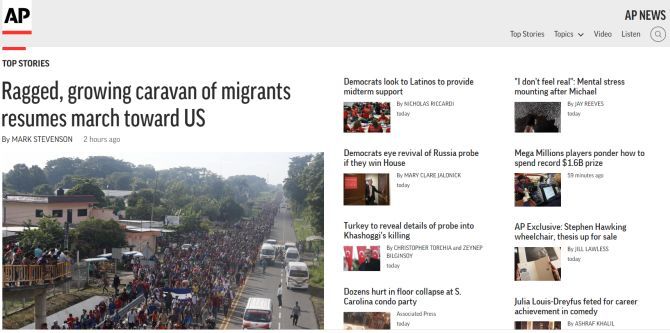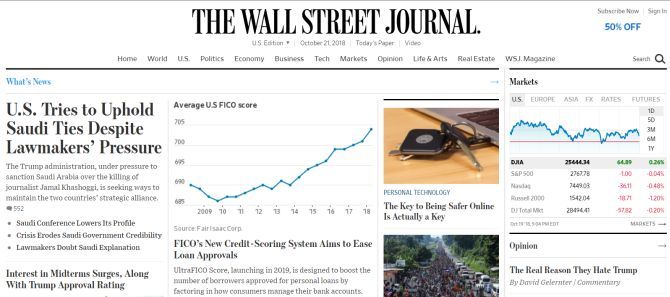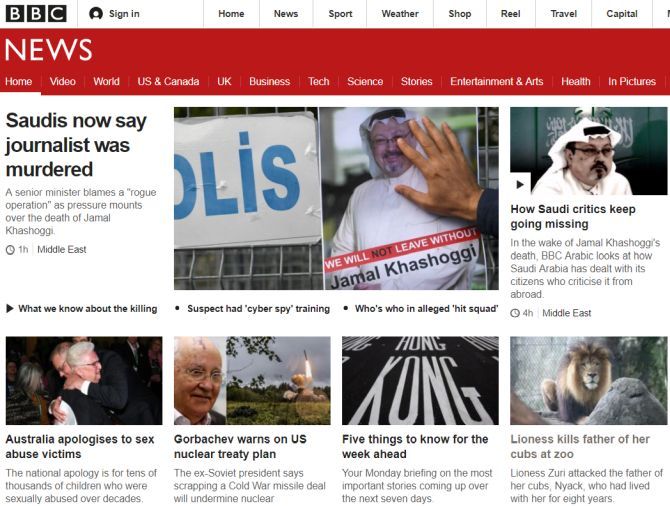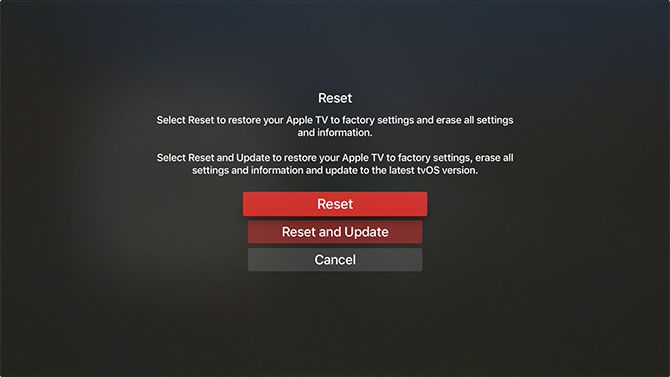

This is a world where money seems to have such control over journalistic integrity. Is there no place for the reader to turn for unbiased news? The short answer is an emphatic yes.
There’s still hope.
When it comes to “censorship”, news can be censored either by the over-reach of government entities or by a corporate stranglehold on the editorial processes of news organizations.
What Is Unbiased News?
It could be an angle placed on news stories about state organizations or policies that are financed by state leadership themselves. There is no better example of this than the Xinhua News Agency, the mouthpiece of the Peoples Republic of China. Or Telegraph Agency of the Soviet Union (TASS), the news agency owned by the Russian government.
However, the US isn’t innocent either. In the US, those controlling the journalists’ pens are corporate leaders rather than government leaders.
In the US, there are six corporate media giants that own 90 percent of the US media market—GE, News-Corp, Disney, Viacom, Time Warner, and CBS.

It would be naive of anyone to believe that the people writing the paychecks for those reporting the news don’t hold some sway over what news gets reported, and how it gets reported.
This is especially apparent during every US Presidential election. Media corporate owners contribute significant campaign contributions to their favored candidates on one hand. On the other hand, they published news stories with a positive spin for their own favored candidate. CNN, Fox News, MSNBC, The New Yorker, and The Blaze are just a few examples.
So are there still any unbiased news sources? Thankfully, there are.
1. The Associated Press

The Associated Press was founded in 1846 and remains a renowned global news organization with 52 Pulitzer Prizes under its belt. It is and has always been the epitome of clear and unbiased news journalism and reporting. It is actually where most journalists seek out their own news stories to report on.
John Daniszewski for the AP wrote a piece about fake news on social media titled “Getting the facts right.” He cited a memo sent out to AP staff by Social Media Editor Eric Carvin where Eric wrote:
“The language we use: Whenever possible, we want to emphasize specifics rather than generalizations or labels. Let’s say what we know to be true and what is false, based on our reporting.”
This is the very definition of unbiased news.
The AP doesn’t only paint rainbows for one side on any story while drawing storm clouds for the other. The language used in each report is neutral, and the focus is only on reporting the news.
2. Wall Street Journal

Wall Street Journal is well known for reporting the news as it is. It serves a healthy dose of reality from both sides of the political spectrum.
It isn’t likely you’ll see a Wall Street Journal White House correspondent trading blows with the President in the Press Room.
The reason for this isn’t because WSJ loves our current president. It’s because you won’t often find antagonistic stories on the front page that are lambasting either side.
They explain what’s happening, who’s doing it and why, without excessive editorializing or using emotion-ridden writing.
WSJ journalists tell it like it is, without letting their own biases (or the biases of the corporate ownership) filter down into the story.
This isn’t an easy thing to accomplish with any news organization.
A contrast to this can be made with Fox News, the bastion of Conservative news reporting.

This isn’t just political bias in the media. Other sites that lack journalistic integrity like this are usually overtly nationalistic (overly pro-American — posting negative news headlines about other countries), or blatantly anti-American (like British news sources that produce a fresh batch of anti-gun editorials in response to every major shooting event that happens in the US—the Guardian is guilty of this quite often).
If you become a reader of the Wall Street Journal, you’ll find yourself more often better-informed, and less often offended or annoyed by the journalist’s choice of words.
3. Google News

Google News isn’t so much a news organization as it is a collection of news sources generated at least partially by a news-gathering algorithm, similar to how Google runs its flagship search engine.
It is partially managed by human editors as well, but the reason Google News is listed here not because the headlines are especially unbiased. It’s listed because of how little human intervention there is in developing front page headlines.
This usually results in a listing of headlines that may not be entirely free from left or right leaning headlines. But you’ll at least discover a healthy mix of each side.
If you believe that no single news organization can be completely free of intrinsic bias, then Google News gives you a place where you can at least see the news reported from the entire spectrum. That’s a great way to get the whole picture, no matter what the news event may be.
4. BBC

If you want to know what’s going on in the world, the BBC is the place to go. You will find better information than the same stories at a US news site.
It may seem ironic that US news organizations appear far more censored and filled with pro-government propaganda than British news organizations.
These days, US foreign policy includes so much government cooperation with corporate US news media. So, the only alternative for Americans (or anyone for that matter), is to turn to foreign news sources for the whole story.
Maybe (hopefully) this will change for the better, but for now this is the only option many Americans have.
5. Reuters

The news organization Reuters deserves honorable mention on this list for the same reasons as the BBC and more. News events on this site are written with some of the most straightforward reporting seen anywhere.
World stories on controversial hot-topics like the Israeli-Palestinian conflict, Brexit, or various government elections, don’t appear to take one side or another. Headlines cover insights from every end of the spectrum.
This is especially refreshing at a time when this kind of journalistic, unbiased news reporting is so rare.
If you want to bookmark only one news website, you should bookmark this one. You will get a fair and balanced perspective on all important matters in the world today.
Other Unbiased News Sources Worth Mentioning
There are a few additional news organizations in the world today that deserve mention. They were not included in the list above because sometimes these sites occasionally let their author’s biases get published.
C-Span and Pew Research aren’t specifically news organizations. But they deserve mention as fantastic resources to learn the deeper truth behind today’s news stories.
- Al Jazeera: Al Jazeera is based out of Qatar. Qatar is quite different from America, where “freedom of the press” is sacrosanct. However, Al Jazeera remains impartial and fact-based regardless. It’s surprising that many Americans prefer an Arabic news source above American ones. That’s the reality of the world today.
- C-Span: Watch government hearings and other events on your own, instead of relying on second-hand reporting. Keep your TV tuned to C-Span. You’ll actually be shocked to discover just how much those second-hand journalists twist what was actually said at those hearings. So why depend on those faulty reports when you can see for yourself?
- NPR: NPR would have landed in the primary list of unbiased news sources above, but its coverage sometimes leans a little too far to the left. However, in the majority of cases, NPR reporting is about as impartial and factual as you could ask for from a US-based news organization.
- Christian Science Monitor: Despite a name that would make you expect it to be a bastion of Conservative news reporting like The Blaze, CSMonitor is actually a refreshingly honest and impartial news source. You’ll find stories here that attack or support government policies from both sides of the aisle.
- Pew Research: Interested in the facts, and only the facts? You can’t go wrong bookmarking Pew Research. Even during heated election years, you’ll find the polls, surveys, and research conducted by this organization to be accurate and truthful. It is self-described as a “nonpartisan fact tank”, and that’s exactly what it is. Don’t get your facts from Facebook. Look to Pew Research to get accurate facts before you make up your mind.
What Bias Really Means
These days, you’ll find anyone who disagrees with a news story angle calling it “biased.” Conservatives hate CNN and MSNBC. Liberals hate Fox News and The Blaze. Everyone in the middle hates them all. So how can you really call any news organization “unbiased”, when so often bias itself is subjective?
Every journalist is aware of the nine principles of journalism. The first says that a journalist’s first obligation is to the truth.
“This ‘journalistic truth’ is a process that begins with the professional discipline of assembling and verifying facts. Then journalists try to convey a fair and reliable account of their meaning, valid for now, subject to further investigation.”
The ability to set aside one’s own prejudices in order to be “neutral” is not a part of those principles. However, “the source of their credibility is still their accuracy, intellectual fairness, and ability to inform.” When journalists let personal biases hinder their objectivity, it puts the entire media organization at risk. Thankfully there are still enough media outlets left that uphold these principles.
If you’re into tech news, there are some great tech news sources to check out as well.
Read the full article: Top 5 Unbiased World News Websites Free From Censorship


